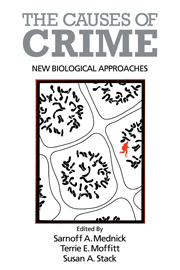Book contents
- Frontmatter
- Contents
- List of contributors
- Preface
- Acknowledgments
- Introduction – Biological factors in crime causation: the reactions of social scientists
- Part I Methodological questions and implications
- 1 Some cautions for the biological approach to crime causation
- 2 Watch out for that last variable
- 3 Implications of biological findings for criminological research
- 4 Definitions of antisocial behavior in biosocial research
- Part II Evidence for the role of genetics
- Part III Psychophysiological and neurophysiological factors
- Part IV Neurological factors
- Part V Biochemical factors
- Part VI Treatment issues
- Author index
- Subject index
2 - Watch out for that last variable
Published online by Cambridge University Press: 04 August 2010
- Frontmatter
- Contents
- List of contributors
- Preface
- Acknowledgments
- Introduction – Biological factors in crime causation: the reactions of social scientists
- Part I Methodological questions and implications
- 1 Some cautions for the biological approach to crime causation
- 2 Watch out for that last variable
- 3 Implications of biological findings for criminological research
- 4 Definitions of antisocial behavior in biosocial research
- Part II Evidence for the role of genetics
- Part III Psychophysiological and neurophysiological factors
- Part IV Neurological factors
- Part V Biochemical factors
- Part VI Treatment issues
- Author index
- Subject index
Summary
Typically, theoretical approaches to the understanding and prediction of criminal behavior are concerned with four classes of variables. The first of these are precursors, or independent variables. The second are process, or intervening, variables. The third are outcome, or dependent, variables. Finally, theorists often attempt to place these etiological paths in contrasting settings by reference to context variables.
For instance, one might attempt to relate neurological deficits (independent) to violence (dependent) via the mediating processes of family control mechanisms (process) in cultures differing in their tolerance for violent behavior (context). Researchers find it difficult to give equal emphasis to each class of variable; indeed, we probably have fairly consistent, stylistic preferences for one or two of the four. This chapter is offered to those whose style of research has made them less familiar with the issues of the dependent variable in criminological research and theory.
The purpose of the chapter is to alert researchers, especially those approaching criminal behavior from backgrounds in other content areas, to a host of issues they will face when predicting delinquent or criminal outcomes. I have the impression, for instance, that systems analysts and operation researchers tend to assume that different systems are generally analogous and that “outputs” are therefore merely variations on a theme. To the extent that the criminal justice system is adversarial and deliberately noncollaborative, the systems analysts will be misled and their conclusions will be misleading.
- Type
- Chapter
- Information
- The Causes of CrimeNew Biological Approaches, pp. 25 - 41Publisher: Cambridge University PressPrint publication year: 1987
- 3
- Cited by



